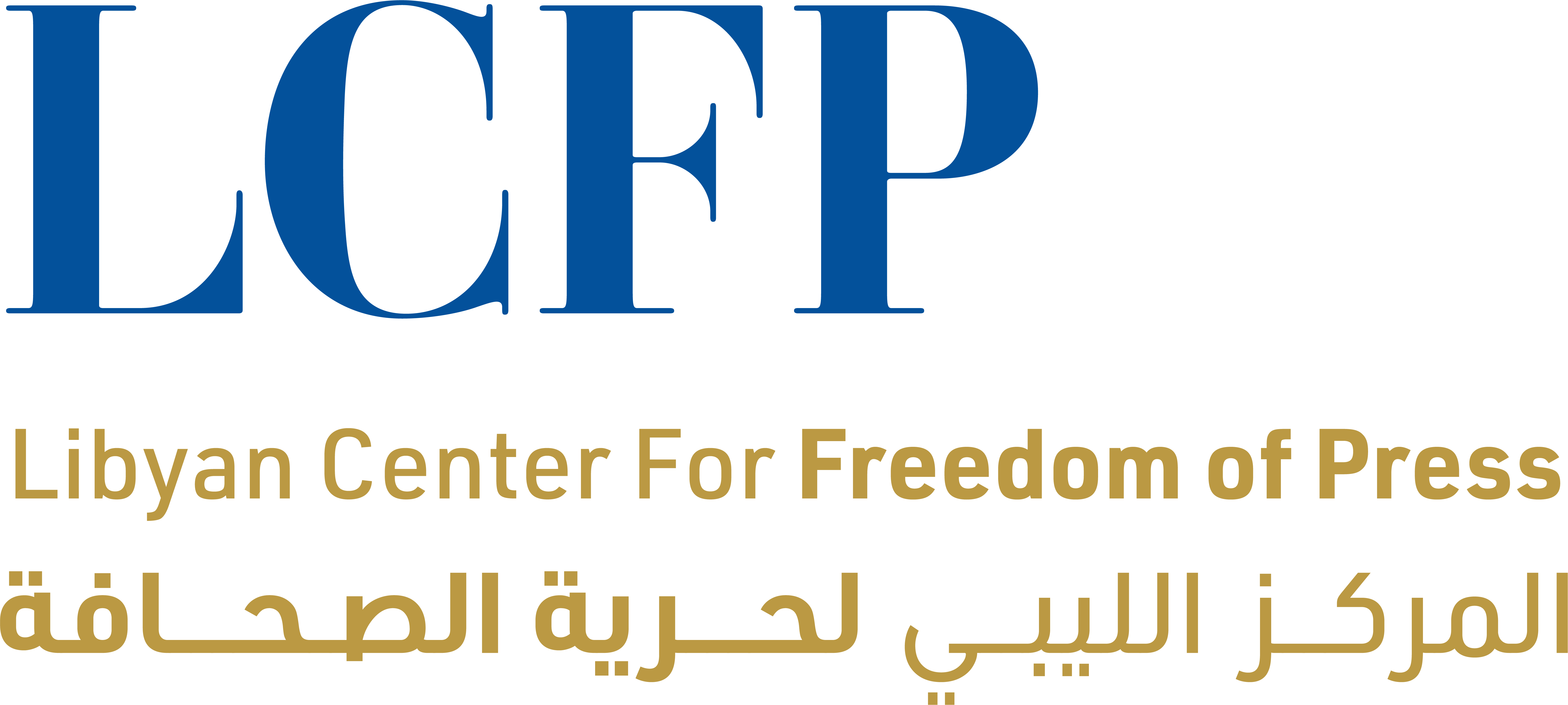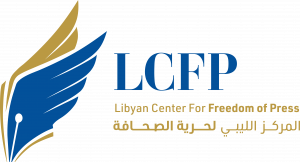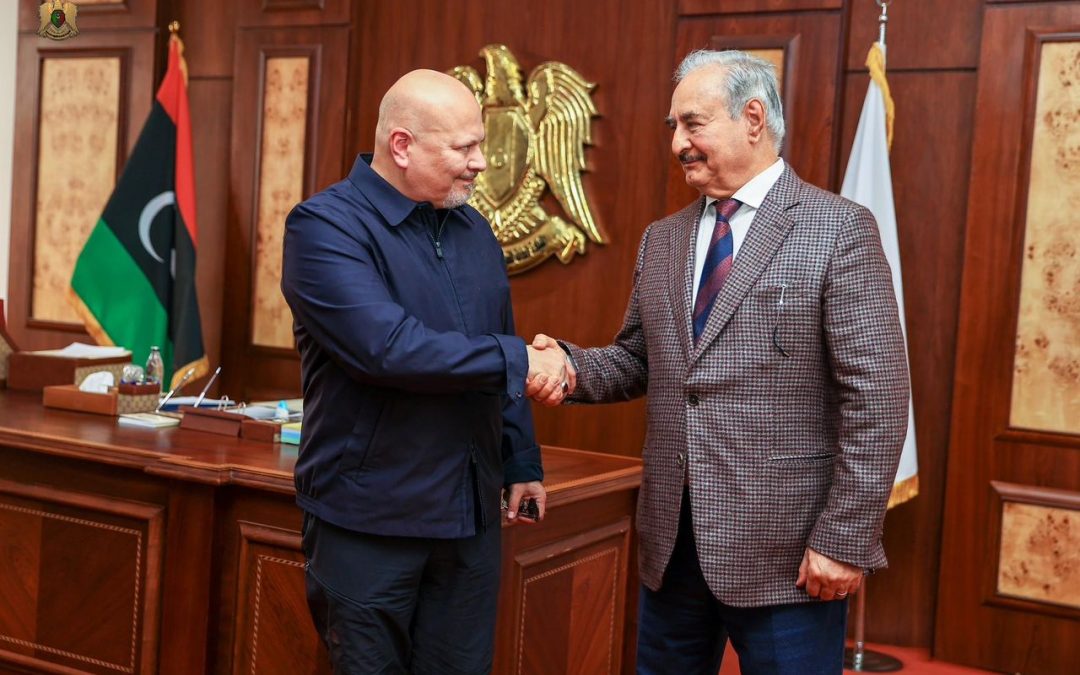
Nov 10, 2022
In response to the Prosecutor of the International Criminal Court (the ICC or the Court) Karim Khan’s meeting with commander of self-styled armed group the Libyan Arab Armed Forces (LAAF) Khalifa Haftar at his office in Benghazi, Libyan civil society demand an apology and accountability for the Prosecutor’s actions
Khalifa Haftar is allegedly responsible for a plethora of serious international crimes and human rights violations. He has been charged with war crimes by a US court, is subject to a criminal investigation in France for allegations of torture, and has previously refused to cooperate with the ICC by failing to handover a wanted suspect. In his briefing to the United Nations Security Council in April 2022, Karim Khan announced that his Office had collected a range of evidence that the LAAF committed serious international crimes, including “indiscriminate airstrikes and shelling of civilian areas; arbitrary abduction; detention and torture of civilians; extrajudicial killings; enforced disappearances; and pillaging of civilian property.” Only last week, Haftar announced another planned military attack on Tripoli
The Prosecutor’s meeting with Haftar is highly offensive not just to the victims of Haftar’s alleged crimes, but to all victims and affected communities of crimes that the Court was established to investigate and prosecute. It is made worse by the fact that this meeting took place shortly after the Prosecutor met with survivor groups and the families of victims in the city of Tarhouna, formerly held by Haftar and the site of multiple mass graves under investigation by the ICC and the UN Independent Fact-Finding Mission on Libya
The insensitivity of the Prosecutor to the situation on the ground is a shocking insult to human rights defenders and civil society actors who have been working tirelessly, to the detriment of their own safety and security, to support the work of the Court
“This meeting has shaken our confidence in the court’s ability to deliver justice and it has confirmed that it is politicised! How can the OTP meet with a torturer in his office? We were expecting arrest warrants for those responsible for war crimes in Libya, not shaking hands and exchanging smiles.” said Ali Alasbali, President of Libyan Crimes Watch and former detainee in Gernada prison under LAAF control
Karim Khan’s willingness to openly meet with the head of an armed group tussling for political and international legitimacy seriously undermines the credibility of the Court, calling into question its impartiality and legitimacy to examine the situation in Libya. As a result, the trust of victims and all Libyans, and their willingness to collaborate with the Court, has been severely damaged. This will ultimately impede the ability of the Court to investigate crimes committed
“It is saddening to see the guardians of international justice and those entrusted with it shaking the hands of the most responsible for war crimes and crimes against humanity instead of holding them accountable, is a frustrating and disappointing spectacle for victims and human rights defenders,” said another human rights defender who works closely with victims in Tarhouna
The undersigned Libyan organisations demand an apology from the ICC and the Prosecutor to victims and civil society in Libya. We also demand the ICC to investigate the actions of Karim Khan and ensure that he is held accountable through necessary disciplinary action.
:Signed by
Lawyers for Justice in Libya (LFJL)
Libya Crimes Watch
Tamazigh Women’s Movement
(LCFP)Libyan Center for Freedom of Press
صفحة القيادة العامة للقوات المسلحة العربية الليبية-الرسمية على الفيس بوك :image source
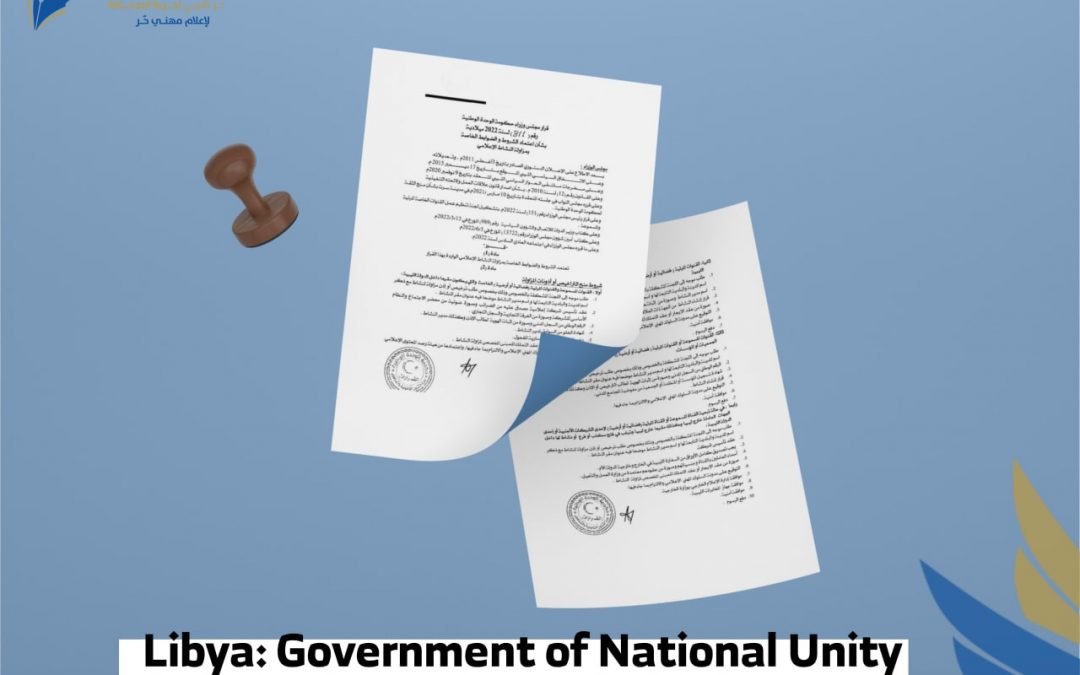
Oct 11, 2022
The undersigned organisations and associations call on the Government of National Unity to repeal its dangerous decision regarding audiovisual media because of the grave risks it poses to the diversity and plurality of the media landscape in Libya, as well as its threat to the integrity of any upcoming electoral process
On 15 September 2022, the Government of National Unity issued Decision n° 811 of 2022 on the conditions and requirements for audiovisual media activities. Decision n° 811 includes irregular stipulations that violate media freedom, such as requiring the approval of the security authorities or the approval of the Libyan intelligence service – and thereby allowing security and military authorities to intervene in the regulation of audiovisual media
The lack of independence of the committee adds to the seriousness of the situation. The Committee for the Regulation of the Work of Private Audiovisual Channels is supervised by the Department of Information and Government Communications at the Cabinet Office, and security agencies have a strong presence within the committee itself: it is headed by a former security officer and several members sit on the committee, including two representatives of the Ministry of Interior and the Libyan intelligence service
The permission to practice is granted by the Committee for the Regulation of the Work of Private Audiovisual Channels, which was established in March 2022 by a government decision, n°151 of 2022. Permission is granted after media outlets meet a set of conditions that determine the legal status of media institutions and outlets that produce audiovisual content, and after they obtain a licence from the Ministry of Interior or the intelligence service or tax administration, and pay the required fees
The government’s decision requires that audiovisual institutions pay high fees ranging from 20,000 to 30,000 dollars for TV channels, and between 7,000 and 10,000 dollars for radio stations. These fees constitute unfair, prohibitive conditions, especially since channels are obliged to pay between 4,000 and 20,000 dollars each year to renew their licence. These conditions threaten the viability of media institutions, which may find themselves unable to continue their activities if they do not meet the approval of the security services or the intelligence service or because of their inability to pay the high amount of fees
The undersigned organisations and associations stress that while it is legitimate to regulate the audiovisual communication sector with the aim of ensuring the plurality and diversity of the media landscape and the transparency of media ownership, it should not end up with the government taking control of the media sector. The upcoming elections in Libya require that media institutions are protected from political tensions and from any threats of closure
The undersigned organisations and associations call on the Government of National Unity to withdraw this dangerous decision and to hold open and transparent consultations with media institutions, civil society organisations and experts to draft a decision that respects media freedom, independence, pluralism and the viability of the media
Here the updated list of signatories:
Signatory organizations
1. ARTICLE 19
2. Aman Organization against discrimination (AAD)
3. Libya Crimes Watch (LCW)
4. Adala for ( AFA)
5. Cairo institute for human rights studies (CIHRS)
6. The Libyan Center for Freedom of Press (LCFP)
7. Belaady Organization for Human Rights
8. Jurists without chains
9. Libyan Legal Aid Organization
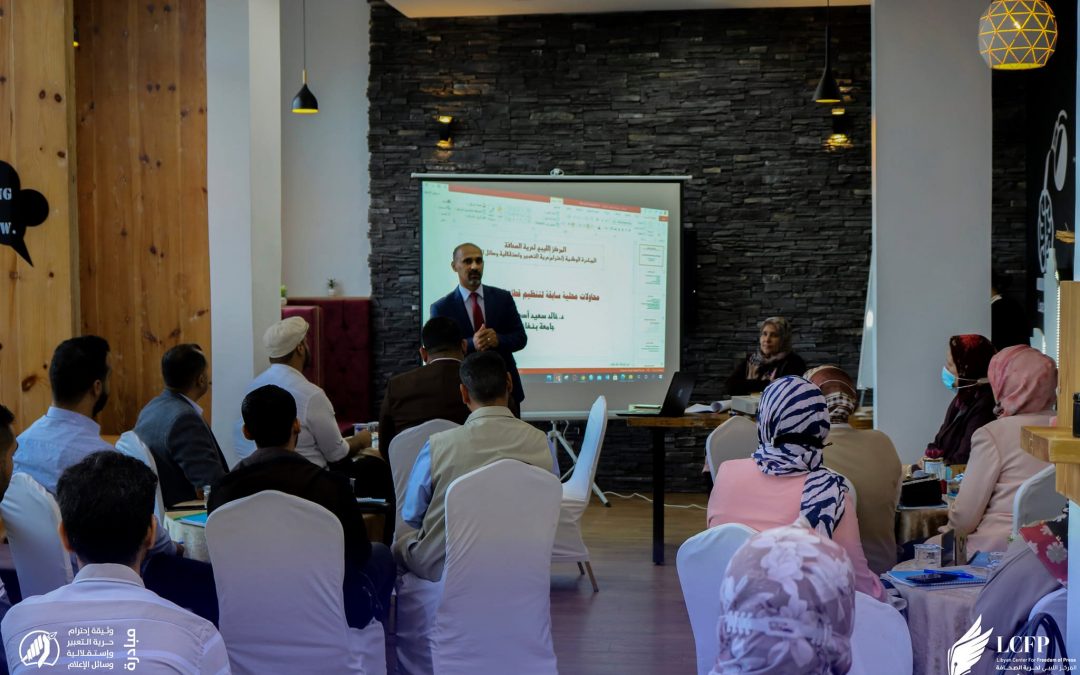
Nov 8, 2021
Benghazi October 30
A discussion session was held in Benghazi city about the National Initiative for the drafting of a “document respecting freedom of expression and the independence of media institutions”. A group of journalists and academics attended the discussion session to discuss their vision for the structural and legal reform of the Libyan media sector. The session was organized by the Libyan Center for Freedom of Press (LCFP) in partnership with lecturers from the Faculty of Media, University of Benghazi
The participants discussed the legal framework required to regulate the radio and television work in accordance with international standards. They tackled the right to freedom of expression and the importance of enhancing the protection of reputation and privacy. They also discussed the responsibilities of the Libyan legislator towards the media sector and the importance of enacting new laws by the upcoming legislative authority
The participants stressed the need for drafting a law establishing the High Constitutional Committee for media in accordance with Article 174 of the constitution, chapter Constitutional Bodies. Article 174 provides for the establishment of the High Media Council as an independent authority over which only the judiciary has authority. The Council’s mission is to regulate the media sector. The participants agreed on the responsibility of the legislator in regulating the Sector by approving the bills of law that are being worked on
It is important to require private media institutions to disclose their sources of funding. The owners of private media institutions should be asked to provide adequate salaries, social coverage, medical insurance and compensation in cases of accidents, diseases and disabilities in conflict areas
The participants stressed the need to distinguish between the right to freedom of expression and the use of hate speech in the media or social media platforms. Legal texts should deter the use of words that fuel incitement and violence. There is a need to develop clear definitions of types of cybercrimes, and to ensure that stakeholders do not exploit cybercrime law to abuse their powers and prosecute activists and journalists
The participants agreed that it is necessary to have an independent national union to play its role in defending the rights of journalists and to issue a “professional journalist card”
This eighth session comes within the National Initiative for the drafting of a document respecting freedom of expression and the independence of media institutions, to which signatures will be collected from candidates to the upcoming presidential and parliamentary elections. It will be a pledge to work with journalists and civil society when deliberating on new bills
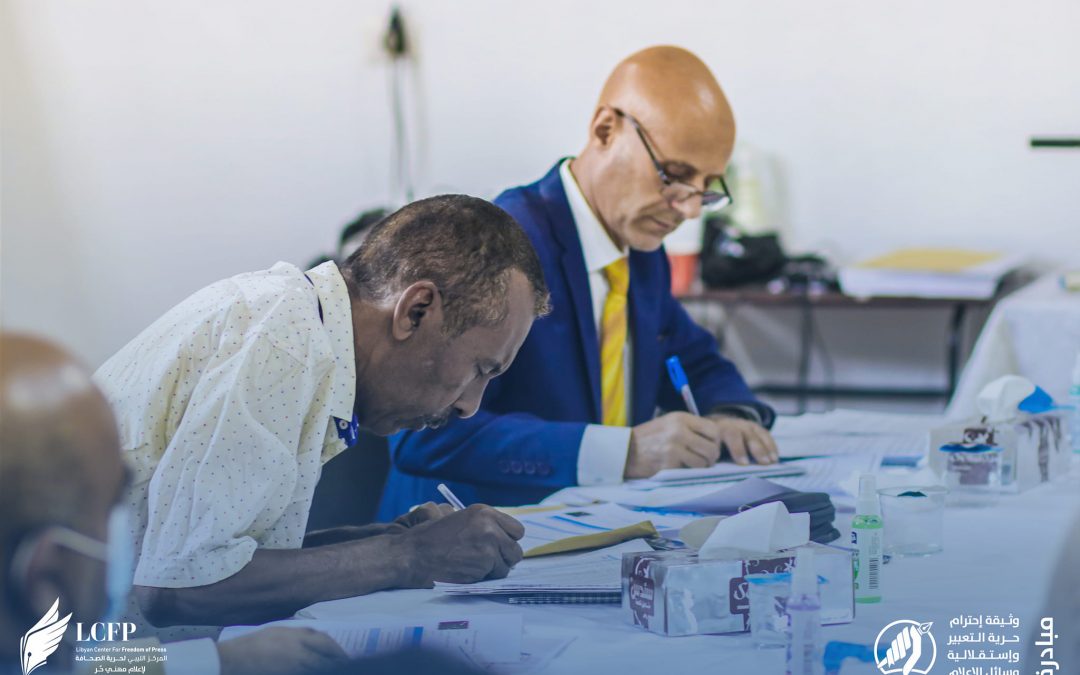
Oct 14, 2021
Sebha/October 11
A new discussion session was held in Sebha city within the National Initiative for the drafting of a “document respecting freedom of expression and the independence of media institutions”. Twenty-eight journalists, television correspondents, academics, lawyers, activists and media professionals took part in the Session. They discussed the need for media practices to be based on national legislations that promote independence and liberty
The participants agreed that it is necessary to draft a law to establish the High Media Council. It should be independent from the executive government. It should be responsible for managing and reorganizing the media sector and public media institutions. It should also reorganize radio and television broadcast, grant licenses to private media institutions and oblige them to disclose their funding sources, and make them respect the regulations and standards the National Media Foundation sets. The National Media Foundation is the highest independent authority. Its role is regulation. The members of its board of directors have the necessary expertise
The participants focused on the need to protect reputation and privacy. It is necessary according to them, to set executive regulations to ensure that media institutions are not involved in spreading rumors and biased news that harm the reputation of others. In addition, the general sanction procedures related to publishing issues should be reformed. The participants agreed that respect should prevail between political actors. Freedom of expression is a sacred right that is a part of the national constants. However, it should not threaten civil peace, public health or public order. Government officials will be bound to disclose information through the ratification of the law on access to information by the coming legislative authority
The participants also highlighted the need to monitor and oversee press and digital content. It is necessary to focus on combating disinformation, hate speech, rumors and spreading of destructive ideas on social media. Internet should be regulated in order to enhance its position as a free digital space
The participants find it imperative to develop educational curricula for Libyan media colleges, to develop media laboratories and to enhance their technical capacities. They also called on the candidates to the upcoming national elections to pledge to work with civil society and journalists on draft laws related to press and publishing. They also have to work on the law of the National Media Foundation, which is being prepared by experts in the field of media and law in the National Committee for reviewing media draft laws administered by the Libyan Organization for Independent Media
The participants emphasized the need for legal and institutional support that goes in line with the challenges facing the Libyan state. It is necessary to respect freedom of expression and independence of media, establishing a national project and unifying media discourse under the umbrella of professionalism, objectivity, quality and efficiency. It is also necessary to have legal texts that explicitly provide for the protection of media professionals
At the end, the participants stressed the need to respect the cultures and characteristics of the Libyan society components. They all have the right to broadcast in their own language and to convey their voice to the Libyans

Oct 6, 2021
Press release The undersigned human rights groups announce the proposal of a new draft law regulating civil work in Libya; the proposed law would guarantee civil society’s independence and freedom. We call on Libya’s civil society organizations to review and adopt this proposal, and pressure for its swift approval. We welcome any comments, suggestions, or feedback to improve the draft law, and affirm the law’s commitment to international standards for freedom of association and peaceful assembly
The undersigned groups are prepared for a public debate on the draft law through urgent hearings in which civil society organizations participate and review the proposed law and its explanatory memorandum This represents a push for the immediate issuance of a law on associations that complies with international standards for freedom of association. The law would also represent a departure from the authoritarian practices under which civil society in Libya has been suppressed, despite the passage of over a decade since the revolution of the Libyan people for freedom and democracy
The proposed draft law guarantees the independence of civil society organizations from the state and its administrative bodies Currently, associations in Libya are struggling to unshackle themselves from the repression of the country’s governing authorities. This repression includes concerted efforts to nationalize civil society and deprive it of independence and freedom to work. Moreover, the draft law emphasizes the importance of the operational transparency of these organizations and their practices, including their activities and funding sources. The proposed law also requires the registration of associations and non-governmental organizations by notification only, and guarantees the freedom to work and form or join local and international networks and alliances
The draft law is a culmination of Libyan civil society’s persistent efforts, ongoing since 2011, to push Libyan state institutions and successive governments to abandon Gaddafi’s authoritarian legal arsenal, especially the Civil Associations Law no. 19 of 2001, which is reflective of the perspective and policies of a dictatorship lacking in any consideration for freedoms and human rights
Libyan civil society participated in the 2013 consultations with the Ministry of Culture and Civil Society to prepare a new draft law to regulate associations, yet the proposal arising from these consultations remains unknown, and has not yet been issued. In 2016, human rights organizations participated in the revision of the draft law on associations, which was proposed by the legislative authority at the time, and despite the submission of the revised version to the House of Representatives in 2017, which was entirely disregarded
Nevertheless, the new proposed law on civil society differs from its predecessors in that it is subjected to scrutiny and examination by many legal experts, judges, and human rights defenders. The proposed law is the result of a meticulous study of experiences and legislation in the region and internationally, in regards to the regulation of civil society’s work. Thus the proposed law benefits from similar legislative proposals submitted by human rights organizations to ensure the independence and freedom of civil society in their countries
16 organizations and 4 public figures submitted this proposed new draft law and are looking forward to presenting it before members of the House of Representatives and representatives of the legislative authority in Libya, with the aim of pushing for the issuance of a new law on associations. Under the proposed law, the tribulations of civil society in Libya would come to an end, ensuring Libyan associations’ ability to perform their role in monitoring and following up on public affairs within a just legal framework that guarantees the independence and freedom of civil society
Accordingly, the signatory organizations renew their call for all Libyan organizations to review the proposed draft law and send their feedback on it, in order to partake in creating legislation that is based upon genuine consensus and guarantees the independence and freedom of civil society in Libya
Signatory organizations
- Defender Center for Human Rights (DCHR)
- The Libyan Organization for Independent Media
- Belady Center
- The Independent Organization for Human Rights in Libya
- Libya al-Moustakbal Center
- Jurists Without Chains
- The Libyan Women’s Platform for Peace
- Adala For All
- The Libyan Judges Organization
- The Libyan Center For Freedom Of Press
- Youth Organization for Tawergha
- Libyan Network for Legal Aid
- Al-Zawiya Center for Human Rights
- Aman Organization Against Discrimination
- Libyan Crimes Watch
- The Libyan Group to Monitor Human Rights Violations
Public figures
- Azza Maghur
- Salah Marghani
- Marwan Tashani
- Wael bin Ismail

